It might be hard to find your way around contracts because they are full of legalese and small print. One minute you’re signing the contract, and the next you’re in a heated argument about what you agreed to. You’re not the only one who has been there, so don’t worry! In fact, knowing how to resolve contract disputes might make things a lot easier for you.
Top Takeaways and Key Concepts
Stay calm and break the dispute into smaller issues to handle one at a time.
Communicate openly and use active listening to clarify misunderstandings before they escalate.
Use mediation as a cooperative, low-stress alternative to court for finding common ground.
Check your contract for arbitration clauses so you know the proper resolution path in advance.
Negotiate with empathy using “I” statements and flexibility to create win-win outcomes.
Summary of This Article
This article uses humor and real-world examples to explain how to navigate contract disputes effectively and calmly. It emphasizes the importance of clear communication, active listening, and emotional control when disagreements arise. Readers learn how to break down complex issues, use mediation or arbitration to resolve conflicts fairly, and approach disputes as opportunities for collaboration rather than confrontation. The author highlights that knowing your contract’s terms, especially arbitration clauses, prevents confusion later. Practical tips—like using “I” statements during negotiation and maintaining an open mind—help turn tense discussions into productive problem-solving sessions. Ultimately, the piece encourages readers to replace hostility with cooperation, showing that most disputes can be settled through patience, empathy, and teamwork.
Understanding Contract Disputes
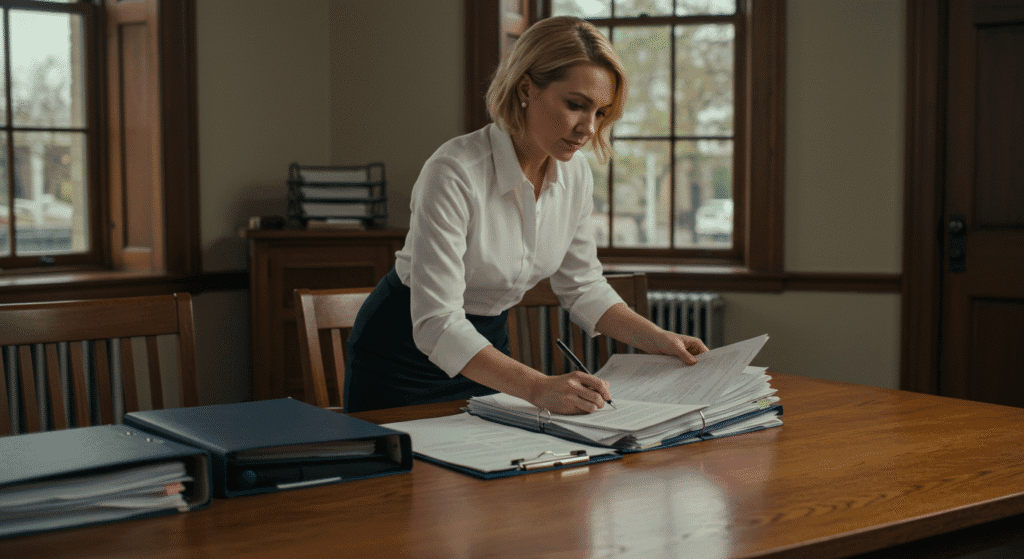
Please Note: This post may contain affiliate links. If you click one of them, we may receive a commission at no extra cost to you. As an Amazon Associate, I earn from qualifying purchases.
👓 In ancient Greece, if you had a contract dispute, you could resolve it by taking the matter to a public assembly where anyone could shout out their side of the argument. Imagine that today—contracts would be settled with loud debates in coffee shops instead of courtrooms! 👓
“Contracts are like marriages; they can start off great but often end up in a messy divorce.” – Unknown
What is a contract dispute, then? It’s when two people don’t agree on what their agreement means, as when you’re trying to figure out if pineapple belongs on pizza (it does!). People often get into these arguments because they don’t understand each other or because their expectations aren’t satisfied. You could have thought everything was clear as day during talks, but now you’re gazing at an email thread that looks like it was written in ancient hieroglyphics and wondering what the hell is going on.
When these kinds of conflicts happen, they can make people feel tense and angry, like trying to untangle a pair of earbuds that have been sitting in your pocket for too long. I mean, who really likes to argue over legal papers? Not me! It’s not really fun, like watching paint dry. The most important thing to remember is that most disagreements can be worked out if you handle them the right way. Think of it as walking on a rocky route. If you have the correct plans in place, you can turn those frowns upside down and work toward a solution that makes both parties happy.
Unraveling the Mystery of Contract Disputes
– The Great Banana Debate: In 2011, a group of lawyers in Canada had a contract dispute over the sale of bananas. It ended up in court because one side thought they were getting ripe bananas, while the other side delivered green ones. Who knew bananas could be so slippery?
– The Coffee Clause: A famous coffee company once had a contract that required them to deliver beans within 24 hours. When they missed the deadline, their client sued for “emotional distress.” Apparently, missing morning coffee can lead to serious legal repercussions!
– Shark Tank Shenanigans: On an episode of “Shark Tank,” one entrepreneur forgot to bring his contract with him and ended up negotiating on a napkin! This led to a deal that became famous, proving that sometimes all you need is creativity (and maybe some coffee).
First, you need to take a big breath. Yes, I know—it’s easier to say than do when you’re looking at a contract that looks like it has more twists than a pretzel factory! But staying calm helps you think clearly and behave logically instead of emotionally. It’s easy to say things you might regret later while you’re feeling emotional. For example, you might say that your neighbor’s dog is plotting against you because it barked at your mailbox.
Next, think about breaking the problems down into smaller components. Instead of seeing the disagreement as a huge mountain in front of you (which can be very scary), attempt to deal with it one piece at a time. This method helps you think more clearly and feel less anxious about the whole thing. You may start by finding particular things you don’t agree on and then talking about them one at a time. It’s like eating an elephant: you have to do it one mouthful at a time.
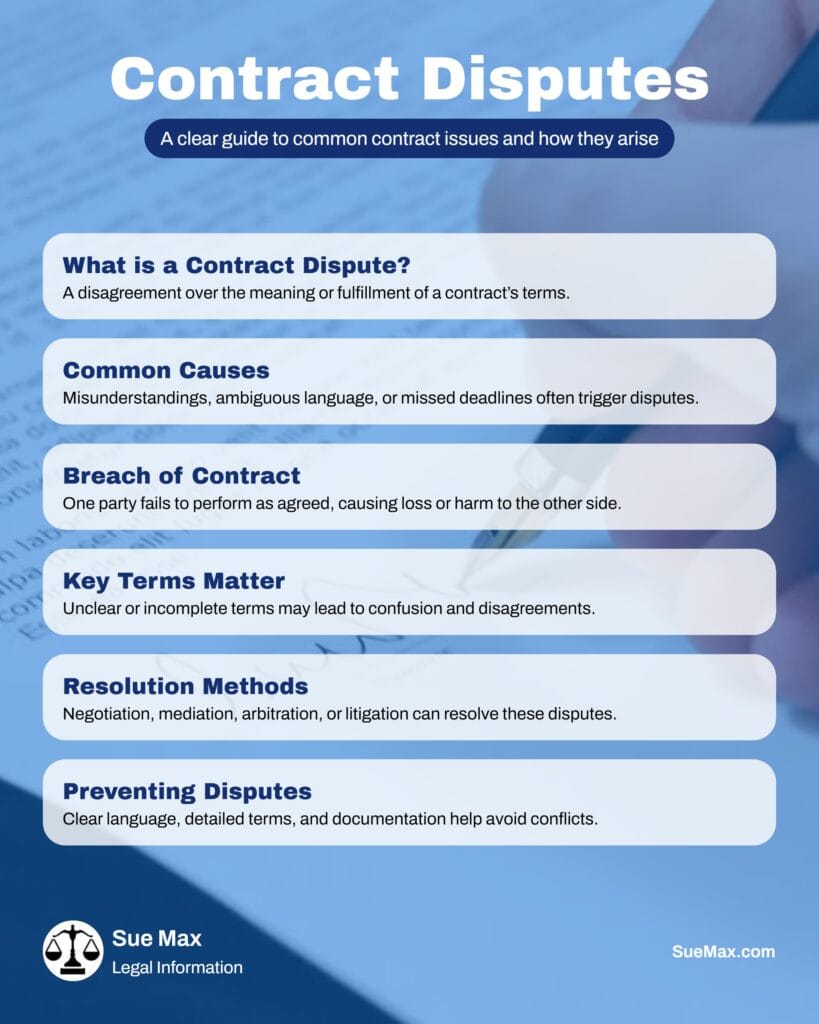
Don’t forget how powerful it is to give in. Sometimes both sides need to give a little to reach an agreement. Think about two kids fighting over the last cookie. Sometimes, sharing or splitting it in half makes both kids happy instead of making them eat their individual halves alone! Also, finding ways to meet halfway during talks can help people get along and make it easier to discover solutions.
Don’t forget that talking isn’t the only part of communication; listening is too. It can be eye-opening to take the time to really listen to what the other person has to say. You might find that misconceptions are just basic miscommunications and not on purpose, like when you thought “next week” meant next Tuesday and they thought “next month.”
Throughout the procedure, have an open mind. Being stubborn frequently gets you nowhere fast; being open-minded can help you find new opportunities you didn’t even know were there. If you deal with disagreements with patience, empathy, and maybe even a little humor, you’re more likely to discover solutions that work for everyone.
When there is a disagreement over a contract or agreement, remember that with the correct attitude and plans, these bumps in the road may turn into chances to work together and progress instead of fights about legalese!
Open Communication: The First Step

👓 In the 18th century, some contracts were so convoluted that people would hire “contract whisperers”—yes, that was a thing! These folks specialized in deciphering legal jargon and translating it into plain language, often with humorous results. Imagine someone saying, “Your contract says you owe them your firstborn, but let’s just call it a misunderstanding!” 👓
“Communication works for those who work at it.” – John Powell
Open communication is the key to settling any disagreement. It just makes everything better! When there are problems because of a contract dispute, taking up the phone or sending an email to talk about them might help a lot. Think about it: how many problems could be solved with just a little talk? Like getting Christmas lights untangled, sometimes all you need is a little time and help from others!
When you talk to the other person in the conflict, do it in a calm way. Don’t blame anyone or point fingers when you tell them what’s bothering you. No one likes to feel like they’re being attacked. Instead of expressing something like “You messed this up!” try stating something like “I saw some problems with our agreement; let’s work together to fix them.” This way, you’re not closing doors; you’re opening them!
The Art of Talking It Out in Contract Disputes
– The Lost Proposal: In 2018, a company accidentally sent their contract proposal to the wrong email address. Instead of getting mad, they called the person who received it, and they ended up negotiating a deal over coffee! Proof that sometimes mistakes lead to sweet surprises.
– Emoji Negotiations: A group of tech workers tried to settle a contract dispute using only emojis. They communicated everything from “I want more money” to “Let’s meet,” but things got messy when someone sent a pizza emoji instead of a handshake. 🍕🤝
– The Cat Clause: One contractor had a dispute about pet policies in their agreement. To resolve it, they held a meeting where each party brought their pets along. After some playful chaos involving cats and dogs, they agreed on terms—proving that open communication can be as simple as sharing snacks (and fur).
And don’t forget to listen actively! Sometimes we get so wrapped up in our own perspectives that we forget to hear what others are saying. It’s like being at a concert where the music is blasting, and you can’t quite make out the lyrics—you’re focused on your favorite song but missing out on what the band is trying to communicate with the crowd. By genuinely considering their viewpoint, you might discover common ground faster than you’d expect.
Active listening isn’t just about nodding your head while mentally planning your next argument. It’s about really tuning in, like when you’re trying to figure out if that strange noise coming from your car is a sign of impending doom or just a loose piece of change rolling around. When someone else is speaking, focus entirely on them. Put down your phone, stop thinking about what you’re going to say next, and give them your full attention. You’ll be amazed at how much more you can learn!

It might also help a lot to ask questions that make things clearer. Don’t be afraid to ask for explanation if anything doesn’t make sense or seems wrong. It’s like being in math class: if you don’t get how they went from point A to point B, raise your hand instead of pretending to take notes while you think about what toppings you want on your pizza. Questions not only indicate that you’re interested, but they also assist clear up any doubt before it becomes worse.
People sometimes just want to be heard. Imagine having a horrible day at work and then telling a friend about it, only for them to instantly start talking about their own problems instead of listening to yours. It seems like a letdown! On the other hand, when someone really listens to you and understands what you’re going through, it might make you feel like you’re not alone and make everything seem a little easier.
Another great way to practice active listening is to repeat what you’ve heard. This indicates that before you say what you think, you should restate or summarize what the other person said. For example, “So, if I understand correctly, you’re upset because…” This method not only indicates that you’re paying attention, but it also helps clear up any misunderstandings straight away.
Let’s talk about body language; even the things we don’t say are important! Leaning a little forward or keeping eye contact (without staring them down like they’re the last piece of pizza) shows that you care and are open. Do you remember when someone was talking to you while they were looking at their phone? It didn’t seem as essential as when they were really there with you. Your body language says a lot about whether or not you’re really interested in what the other person is saying.
Keep this in mind: active listening isn’t simply a nice idea; it’s a talent that can turn boring talks into meaningful ones full of understanding and cooperation. Listening carefully will bring everyone closer together, whether you’re arguing over a contract or just having coffee and talking about which superhero would win in a fight. Who knows? You might uncover answers faster than you ever imagined imaginable!
Mediation: A Friendly Third Party

👓 In ancient Greece, mediators were often chosen based on their ability to bake excellent bread. The idea was that if they could rise dough well, they could also help people rise above their disputes—because who wouldn’t want to settle a contract issue over a warm loaf? 👓
“Sometimes the most productive thing you can do is relax.” – Mark Black
Mediation can be one of those amazing ways to change fighting into working together. Imagine this: instead of fighting it out in court (which sounds like a lot of fun), both sides agree to meet with a neutral third party, called a mediator, to assist them talk things over. It’s like having a referee when you’re playing dodgeball really hard!
Mediators are skilled experts that help people talk to each other and find a middle ground without taking sides. They give things structure and help keep emotions in check. Let’s face it, no one likes to witness someone toss their coffee cup over the table during talks!
Mediation: The Peacekeepers of Contract Disputes
– The Mediator’s Secret Weapon: Some mediators use snacks to help ease tensions. A plate of cookies or a bowl of popcorn can turn a heated argument into a friendly chat. Who knew chocolate chips could be so powerful?
– Role Reversal Fun: In one mediation session, the parties were so frustrated that they decided to role-play each other’s positions. Suddenly, the person who wanted more money had to argue for less! They ended up laughing and finding common ground—who knew pretending could solve problems?
– Pet Mediation: One mediator brought their dog to a session as an icebreaker. The sight of a fluffy pup made everyone relax, and they spent half the time discussing who would pet the dog next instead of arguing about contracts. Sometimes, all you need is a furry friend to mend fences!
In mediation meetings, each side has a chance to say what they think, and the mediator helps them discover places where they can both agree. Think of it as a nice game of tug-of-war, except instead of pulling against each other, everyone is working together to reach a medium ground. It’s like trying to figure out who gets the final slice of pizza at a party! It’s all about achieving the right balance so that everyone feels heard and respected.
When you go to mediation, it’s more like going to a cozy café than a courtroom. The mood is usually more laid-back, which can help calm things down a bit. Everyone has a chance to say what they want to say without being interrupted. It’s not enough to only say facts; you also need to share your feelings and points of view. We are not robots that are programmed to say legal terms; we are people with thoughts and sentiments!
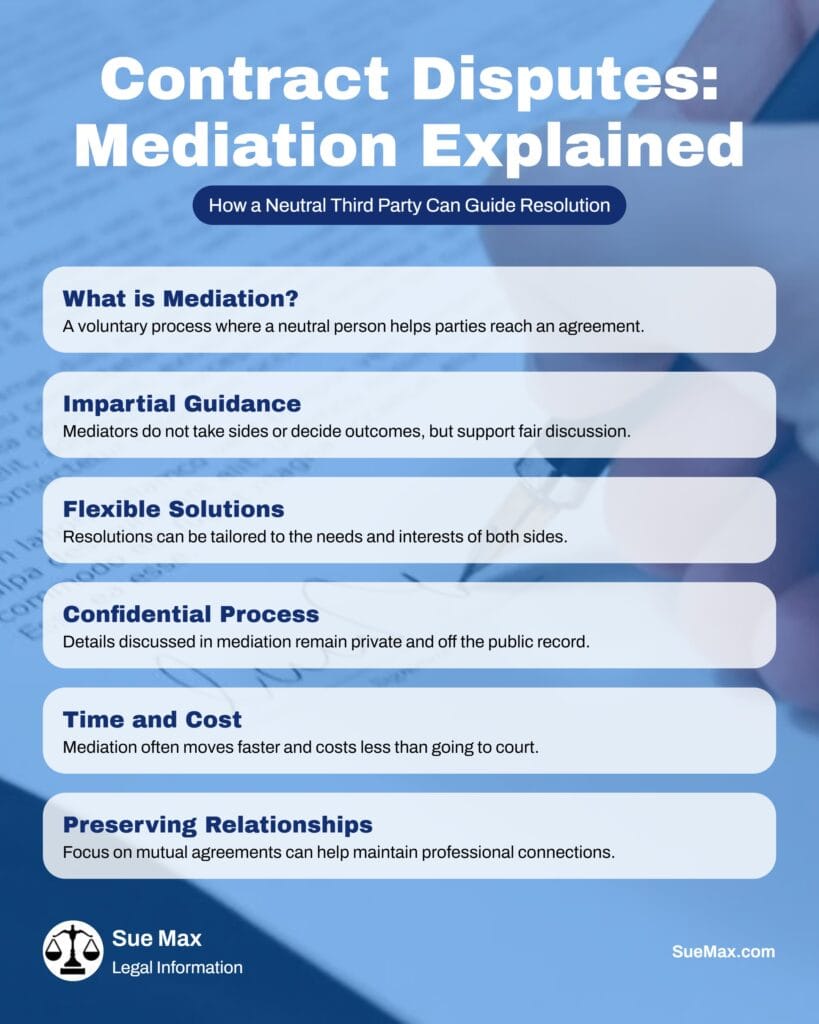
The mediator is quite important in this case. Think of them as the referee in this negotiation game. They make sure that both parties have the same amount of time to speak and that things stay calm and constructive. They don’t pick sides or make conclusions for you; instead, they steer the conversation like a tour guide through a complicated maze. Their goal is to clear up any confusion and point out things that everyone has in common that might have been missed in all the arguing.
Reframing is one way that mediators can help. For example, one person can say, “You never listen to my ideas!” A good mediator can respond, “What I hear is that you really want your ideas to be taken into account.” This small tweak can change the tone from accusing to helpful, which will make it easier to talk to each other in the future.
Coming up with possible solutions jointly is another crucial part of mediation. It’s time to get creative now that both sides have said what they need and want. Imagine that you’re attempting to make arrangements with pals for Saturday night. You toss around ideas until someone proposes karaoke night instead of going out to eat. Also, during mediation sessions, people can work together to create solutions that meet everyone’s requirements instead of merely sticking to their original requests.
It can help to hear what someone else thinks to get your brain working! You might believe you know everything, but then someone comes up with an idea so good that you wonder why you didn’t think of it first. Mediation helps this form of teamwork by encouraging people to talk to each other instead of fighting.
Mediation gives people who are fighting a chance to understand and empathize with one other. People are more likely to be happy with the outcome of these talks if they feel that they are being heard and respected, even if they don’t agree with it.
Think about how useful mediation may be when you have a disagreement or conflict, whether it’s about a contract or something as small as picking a movie. Many disagreements can turn into chances for growth and teamwork instead of sources of irritation if both sides are ready to be patient and listen to an unbiased mediator.
Arbitration: A More Formal Approach

👓 In the medieval times, arbitration was often handled by a “wise woman” or village elder who would settle disputes using nothing but her intuition and a few chickens. If the chickens clucked in agreement, the decision was considered final—because nothing says justice like poultry approval! 👓
“Justice is what love looks like in public.” – Cornel West
Let’s talk about arbitration now. It’s a step up from mediation, but it’s still not as scary as going to court. In arbitration, both sides submit their case to an arbitrator (like a court but not quite) who listens intently and then makes conclusions that both sides must follow based on the facts presented.
When both sides want to be clear but don’t want to go through long court battles with plenty of paperwork and delays, arbitration is a good option. Who has time for that? Overall, arbitration is usually faster than regular litigation, but it still gives formal answers.
Arbitration: The Formal Face-Off
– The Judge’s Fancy Chair: In arbitration, the arbitrator often sits in a special chair that looks like it belongs to royalty. It’s not just for show; sitting high up makes them feel important—like they’re about to make a big announcement, like “You win… but only if you bring donuts!”
– Secret Handshakes: Some arbitration agreements include clauses that sound more like secret society rules. Imagine having to learn a handshake before you can start negotiating! Just remember, no one wants to be the person who messes up the handshake and ends up with a contract dispute over it.
– The “Arbitration Olympics”: Did you know some people take arbitration so seriously they treat it like an Olympic sport? There are competitions where lawyers practice their arguments as if they’re training for gold medals. Watch out world, here come the podium finishers of pointing out fine print!
But it’s vital to always review your original contract to see if it has an arbitration clause. Some contracts require conflicts to go through this process before moving on to other possibilities. Picture yourself at a party and seeing a game of charades starting. You can’t just go in without knowing the rules, can you? The same is true for contracts: knowing what’s in them can help you avoid a lot of confusion later on.
Arbitration provisions are like that friend who won’t start a board game until they’ve read the rules. They make the rules for how to deal with any problems that come up. If your contract has one of these clauses, it usually implies that if something goes wrong, like two parties disputing over deliverables or timetables, you could have to settle such problems through arbitration instead of going straight to court. This is very important because not doing this step could generate legal problems in the future.
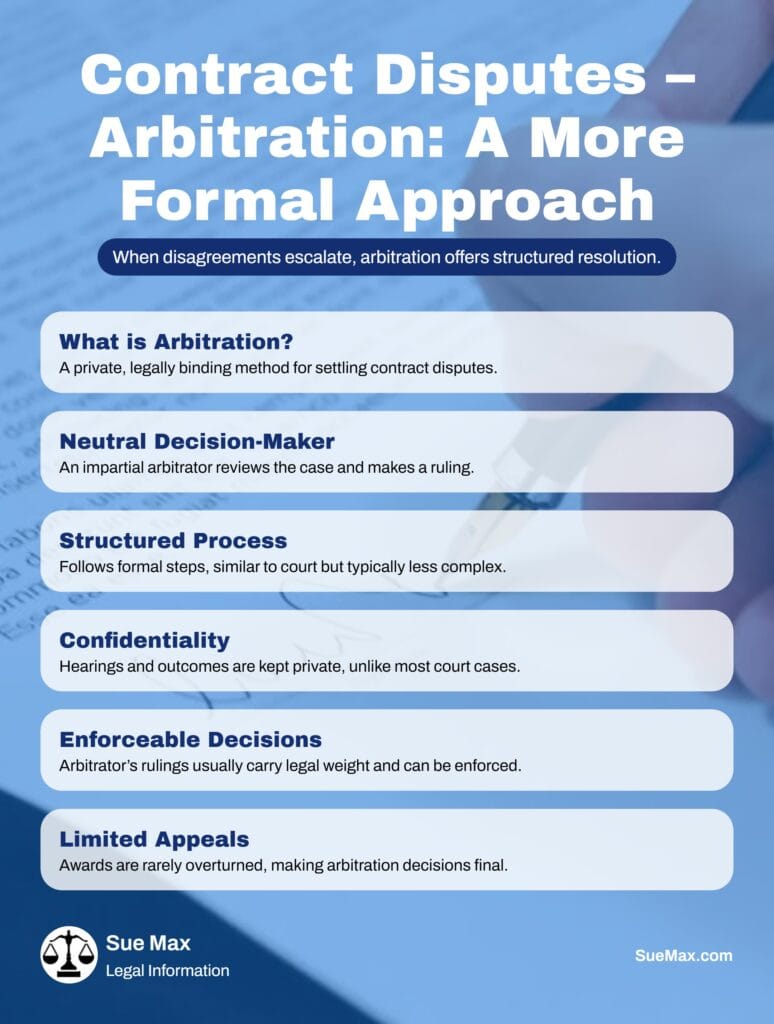
So, what is arbitration, exactly? It’s like going to court, but without all the fuss and drama. In arbitration, both sides present their cases to a neutral third party, the arbitrator, who subsequently issues a ruling that both sides must follow. It usually costs less and takes less time than going to court, which sounds great when you think about how long court cases can last, like a never-ending soap opera!
Here’s where things get interesting: not all contracts are the same! Some people could have very strict rules on how arbitration should happen. For example, they might decide if it happens in person or online (hello Zoom calls!), how many arbitrators will be there, or even what rules will be used. At first, this level of information may seem too much, but trust me, it’s worth looking into.
Don’t worry if your contract has an arbitration clause. It doesn’t mean you’ve given up all your rights; it merely shows you how to settle disagreements. Knowing this ahead of time helps you become ready and plan properly. You wouldn’t want to go up to that charades game unprepared and find out that everyone else has been working on their acting talents!
If you happen to discover that there’s no arbitration clause in your agreement, simply rejoice! That gives you more flexibility in choosing how to handle any disputes that arise down the road. Whether it involves mediation or jumping straight into litigation depends on what feels right for both parties involved.
Always take a good look at your contract before entering any negotiations or making assumptions about dispute resolution processes. Knowing whether an arbitration clause exists can help guide your next steps effectively while ensuring you’re not caught off guard by unexpected twists along the way! So, grab that magnifying glass—or maybe just squint really hard—and give those fine print details some love!
Negotiation Techniques That Work

👓 In ancient Rome, negotiators would sometimes use a technique called “the art of the deal” where they’d offer a goat as part of the negotiation process. If the other party accepted, it meant they were serious; if they refused, well, at least you still had a goat to keep you company! 👓
“Negotiation in the classic diplomatic sense assumes parties are more anxious to agree than to disagree.” – Dean Acheson
Not only do car salesmen use negotiation to get you into that gleaming new automobile, but it’s also important for settling contract issues! To be fair, good bargaining skills can save time and energy and make sure everyone is happy, or at least not angry.
Before you start negotiating, make sure you know what your top priorities are. What do you really need? What would be good but isn’t necessary? Knowing your bottom line will provide you strength in conversations since you’ll know what’s most important.
Negotiation Techniques: Secrets of the Trade
– The “Good Cop, Bad Cop” Dance: This classic negotiation tactic isn’t just for movies! It’s like a weird dance where one person is super nice and the other is grumpy. They switch roles so fast, you might think they’re auditioning for a buddy cop film—just with fewer car chases and more paperwork.
– The Power of Silence: Sometimes, saying nothing is the best strategy. Picture this: you ask for a raise, and your boss goes silent. That awkward pause can feel like an eternity. But guess what? It puts pressure on them to respond! Just don’t forget to breathe during that silence; it’s not a staring contest!
– Chocolate Bar Diplomacy: Bringing snacks to negotiations can work wonders! Offering chocolate or cookies can sweeten the deal—literally! Nothing says “let’s make a deal” like sharing a snack. Just be careful not to eat all the treats yourself; that might lead to some very serious contract disputes!
Also, while talking about problems, think about employing “I” statements instead of “you” comments. For instance, “I’m worried about…” instead of “You didn’t do…” This minor tweak makes the focus on feelings instead of accusations, which helps keep interactions calmer in general. You might be wondering why this small change is so important. Okay, let me tell you!
When we say “you,” it often feels like we’re blaming someone else. Imagine playing dodgeball and every accusation feels like a ball coming right at your face! It can make the other person defensive faster than you can say “miscommunication.” Now, instead of having a productive talk, you’re both ducking and avoiding emotional missiles. Not the finest way to settle disagreements, is it?
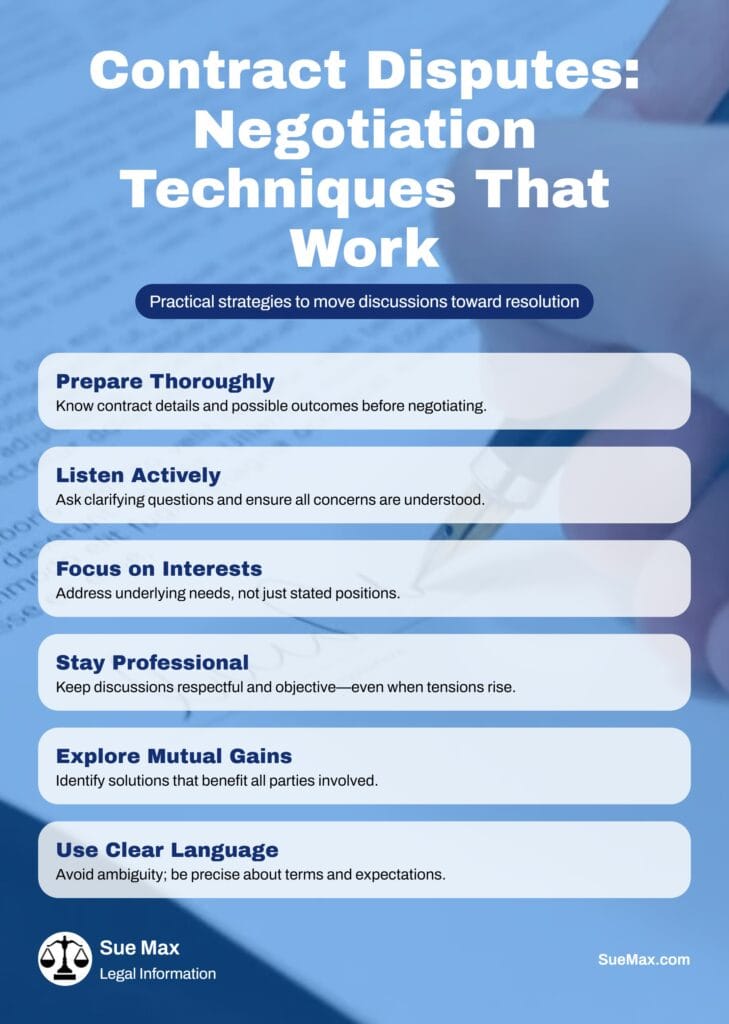
“I” statements, on the other hand, make it easier for people to talk to each other. They let us say how we feel without making other people feel bad. When I express something like, “I feel overwhelmed by the work,” it makes room for understanding and compassion. The other individual is more likely to respond with kindness than to feel threatened or attacked.
Using “I” phrases can assist us figure out what’s actually bothering us. We assume we know what’s bothering us until we say it out loud. When we talk about our own feelings first, we give ourselves an opportunity to think about what’s really going on in our thoughts and hearts. It’s like taking a moment to check in with yourself before you jump into the deep end of resolving a disagreement.
Another benefit? It makes people responsible! Using “I” statements to take responsibility for our sentiments shows that we are willing to have an honest conversation without blaming someone else. This generates a good tone that makes people want to work together instead of fight.
Don’t get me wrong; there are occasions when you need to be direct, but you may be direct without being rude! Instead of saying, “You always forget deadlines,” try adding, “When deadlines aren’t met, it makes me anxious because it affects my planning.” Can you hear how much better that sounds? You’re still talking about a problem, but you’re doing it in a way that gets people talking instead of shutting them out.
Before you get ready for a heated debate about work or domestic tasks, take a deep breath and think about how you’re saying what you want to say. Changing “you” to “I” might change not only what you say but also how you and the other person interact with each other.
At first, practicing this strategy could take some work (like learning to ride a bike), but once you get the hang of it, you’ll discover that having difficult talks is much easier and more fruitful! Also, who doesn’t want their conversations to seem less like battlefields and more like brainstorming sessions where everyone works together? Try those “I” phrases; you might be amazed at how well things go!
Last but not least, keep open-minded! Sometimes concessions take us in directions we never thought they would, but they can sometimes lead to great rewards!
Conclusion: Let’s Move Forward Together
My last point is that resolution solutions for contract disputes don’t have to be intimidating or hard to understand. Whether it’s by talking openly, mediation sessions with friendly referees (also known as mediators), or good negotiation skills, the goal is always the same: to reach common ground where both sides feel heard and appreciated.
Keep in mind that not every argument has to end in chaos or anger. Instead, let’s use working together as our guiding light to find solutions that work for everyone!
Suggested Resources
The Basics of Contract Law
https://www.nolo.com/legal-encyclopedia/basics-contract-law-29750.html
How Mediation Works
https://www.mediate.com/articles/mediation.cfm
Understanding Arbitration
https://www.investopedia.com/terms/a/arbitration.asp
Tips for Effective Negotiation
https://hbr.org/2015/01/the-art-of-negotiation
Conflict Resolution Skills
https://www.skillsyouneed.com/ips/conflict-resolution.html
Frequently Asked Questions
What is the first step in resolving a contract dispute?
The first step is staying calm and breaking the disagreement into smaller, manageable issues so each concern can be addressed clearly and logically.
How can communication help prevent contract disputes from escalating?
Open communication and active listening help clarify misunderstandings early, reducing tension and encouraging both sides to work toward a fair solution.
When is mediation useful in contract disputes?
Mediation is helpful when discussions stall, offering a cooperative, low-stress way to find common ground with guidance from a neutral third party.
What role does arbitration play in resolving disputes?
Arbitration provides a more formal alternative to court where an arbitrator reviews evidence and makes a binding decision, often faster than litigation.
Why is reviewing the contract important before taking action?
Contracts often contain resolution clauses, such as arbitration requirements, so reviewing terms ensures you follow the correct dispute process.
What negotiation techniques can improve dispute outcomes?
Using “I” statements, staying flexible, and focusing on shared goals can create a collaborative atmosphere and lead to win-win resolutions.
How can disputes be turned into opportunities for better collaboration?
Approaching disagreements with empathy, patience, and an open mind encourages teamwork and can transform conflict into improved partnerships.

Kevin Collier is a legal expert passionate about simplifying complex legal concepts for everyday individuals. With a focus on providing clear, practical information, he covers a wide range of topics, including rights, responsibilities, and legal procedures. Kevin aims to empower readers with the knowledge they need to navigate the legal landscape confidently, ensuring they can make informed decisions regarding their legal matters. Through insightful articles and easy-to-understand resources, he helps demystify the law, making it accessible to all.










